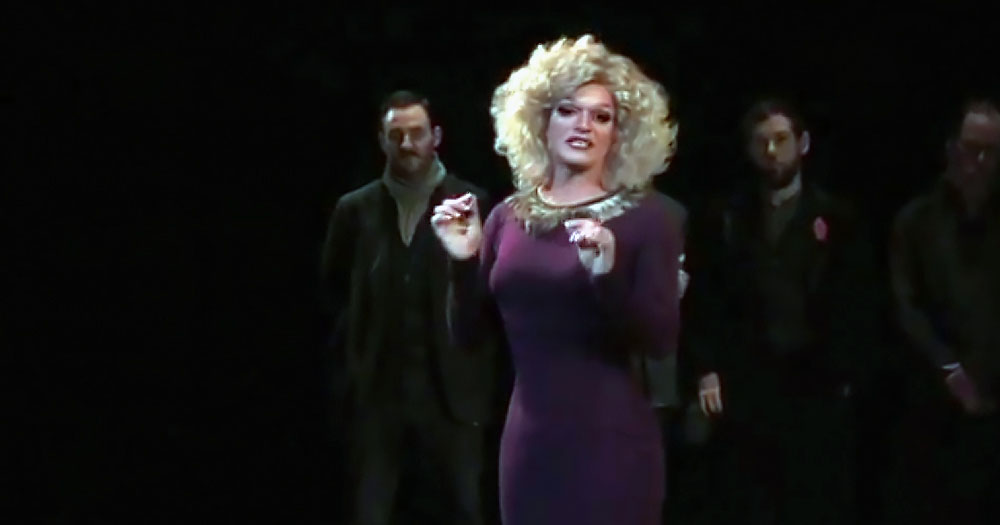Today, May 22, 2023, marks eight years since the momentous passing of the Marriage Referendum. The 2015 ballot saw Ireland make history by becoming the first country in the world to publicly vote same-sex marriage into the constitution.The result had a seismic impact not just in Ireland but globally, quickly prompting other countries to follow suit in amending legislation.
The campaign was fought and won on many platforms, from the people who knocked on strangers’ doors to those who painted murals and lobby groups working with politicians, to people having difficult conversations with conservative families. And, of course, there was the toxic public debate across national media, the most contentious of which was undoubtedly sparked by what came to be known as Pantigate and the Noble Call.
So what exactly was Pantigate?
On January 11, 2014, drag queen Panti Bliss was invited to perform on the Saturday Night Show, hosted by journalist and broadcaster Brendan O’Connor on RTÉ television, Ireland’s national broadcaster. Following her performance, Panti was interviewed by O’Connor as her alter-ego Rory O’Neill.
During the discussion, O’Neill inferred that there were certain people in the public realm who were homophobic. O’Connor further pushed O’Neill to name names, and he identified two journalists and members of a conservative religious organisation.
Shortly after the interview was broadcast, the named parties issued defamation letters to O’Neill and RTÉ demanding a retraction and apology. RTÉ immediately removed the interview from all online channels, and on January 25, O’Connor made a statement of apology, saying: “Now, on The Saturday Night Show two weeks ago, comments were made by a guest suggesting that… some members… are homophobic. These are not the views of RTÉ, and we would like to apologise for any upset or distress caused to the individuals named or identified.”
He concluded, “It’s an important part of democratic debate that people must be able to hold dissenting views on controversial issues.”
Dissatisfied with the apology, the group proceeded to take legal action against RTÉ. The following week, it was reported that the broadcaster would be awarding €85,000 in damages to the five litigants.
The payout caused a mass uproar both because of the rash nature of the settlement and also the fact that the money would be coming from public funding through TV licences.
Over the following months, it was debated in the Dáil, on national TV and radio and even at the European Parliament, with Irish MEP Paul Murphy calling the payout “a real attack on the freedom of speech”. As an example of the plaintiffs’ homophobia, he identified specific instances that he believed supported the claim, such as referring to same-sex marriage as “a kind of satire” or saying, “Equality must take second place to the common good”.
As the Pantigate debate raged on, often becoming heated and toxic, Panti was invited onto the stage of the Abbey Theatre to make a Noble Call.
Report on today’s Senate debate on homophobia, free speech, RTE, and Pantigate. Minister’s comments interesting. http://t.co/Y35pShuIV1
— Dr Panti Bliss-Cabrera (@PantiBliss) February 18, 2014
During a run of the play Strumpet City, the Abbey invited different public figures to respond to the play’s themes in the form of a ‘Noble Call’ at the end of each performance.
On February 1, 2014, for the show’s final performance, Panti was the invited guest. The speech she delivered was nothing short of masterful, and had there not been a camera on hand to record it, it would have become the stuff of legend.
With the echoing chorus of “that feels oppressive”, she encapsulated not just what it was like to experience homophobia but spoke to anyone who had ever been part of a minority.
She also perfectly summed up the hypocrisy of the Pantigate debate saying, “…homophobia is no longer available to gay people… gay people are not the victims of homophobia, homophobes are the victims of homophobia.”
Within hours of the speech being posted online, it started to go viral, and within two days, it had clocked up 200,000 views and had been captioned into 16 different languages. Over the course of the next year, the visibility Panti generated for the campaign for same-sex marriage was unprecedented.
The Noble Call garnered support from global celebrities such as Madonna, RuPaul and Stephen Fry. It was remixed into dance tracks, including ‘Oppressive (The Best Gay Possible)’ by the Pet Shop Boys. She went on to present a TED talk, receive an honourary degree and a Person of the Year Award, and have the dress she wore on the Abbey stage donated to the National Museum of Ireland for its first-ever LGBTQ+ exhibition.
As was mentioned at the start of this article, the marriage referendum was by no means an individual effort. It took a whole nation, and anyone who played their part in making that happen should feel immensely proud, but we cannot underestimate the impact that Pantigate and the Noble Call had on sparking public debate and calling the community to arms.
© 2023 GCN (Gay Community News). All rights reserved.
Support GCN
GCN is a free, vital resource for Ireland’s LGBTQ+ community since 1988.
GCN is a trading name of National LGBT Federation CLG, a registered charity - Charity Number: 20034580.
GCN relies on the generous support of the community and allies to sustain the crucial work that we do. Producing GCN is costly, and, in an industry which has been hugely impacted by rising costs, we need your support to help sustain and grow this vital resource.
Supporting GCN for as little as €1.99 per month will help us continue our work as Ireland’s free, independent LGBTQ+ media.

comments. Please sign in to comment.